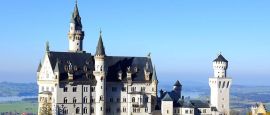Germany Shopping and nightlife
Shopping in Germany
Germany offers the range and variety one would expect from such a large, developed country - if you want it, you'll find it - but special purchases include precision optical equipment such as binoculars and cameras, porcelain, handmade crystal, silver, steelware, Solingen knives, leatherwear, sports equipment, toys from Nuremberg toys fair and Bavarian Loden cloth. Special purchases in eastern Germany include musical instruments, wooden carved toys from the Erzgebirge Mountains and Meissen china (the workshops in Meissen are open to the public). Cuckoo clocks, contrary to popular myth, did not originate in Switzerland, but in the Black Forest region.
German crafts are, of course, available year-round, but you'll find a particularly broad selection during the ubiquitous Christmas markets. The best of the wooden toys have been made with great attention to detail. Expect to also see broad selections of marionettes and carved figurines, as well as candles and festive winter clothing. It's the overall atmosphere, however, that has really helped these markets become such a well-borrowed institution – an ambiance greatly aided by the mingling smells of hot chestnuts and mulled wine.
High-end designer goods are best sourced in major cities, particularly Berlin. German brand names like Birkenstock, Jack Wolfskin, Hugo Boss and Adidas feature prominently, and while the prices might not be much lower, you're likely to find a broader selection of these goods than in other countries. Across the country, meanwhile, you'll also find that cities cater – in varying degrees – to those with alternative lifestyles. In places like Berlin and Hamburg, you'll be able to find a broad range of vintage clothes, independent boutiques and record shops.
Nightlife in Germany
Germany's nightlife spans the full spectrum from high culture to tankard-clinking shindigs. In all the country's larger towns and cities, visitors will have the choice between theatre, opera (Deutsche Oper Berlin, Hamburgische Staatsoper, Dresden's Semperoper and the National Theatre in Munich being some of the most famous names), bars with live music, and a varied roster of nightclubs. The country is particularly renowned for its electronic music scene, one of the largest of its kind in the world. Hip-hop and heavy metal also have large followings.
Berlin, in particular, is famous for its large selection of after-hours venues - the up-all-night spirit of the Cabaret years still burns strong. Traditional folk music is found mostly in rural areas. There are numerous bierkellers in the south while small wine cellars are common in the Rhineland Palatinate, Franconia and Baden region. Hamburg's Reeperbahn is the country's best known centre for 'adult' entertainment.
The once-illustrious Love Parade Festival, which originated in Berlin in 1989 and came to symbolise the country’s fondness for electronic dance music, was held for the last time in 2010, at the city of Duisburg in the western Ruhr area. The decision to end the event stemmed from the tragic death of 21 festival-goers, caught up in severe overcrowding.





 You know where
You know where
